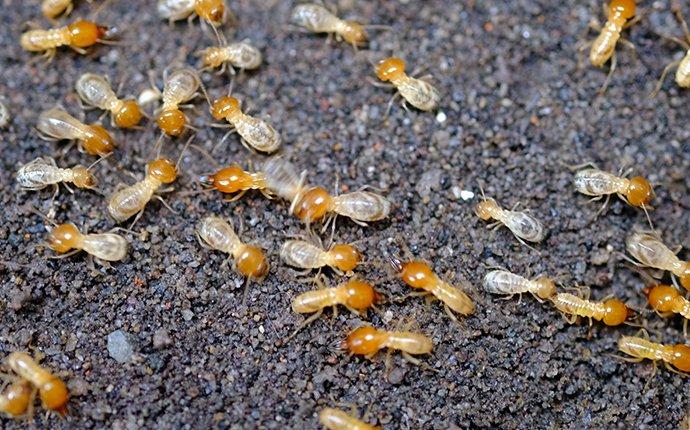Environmental Effect of Pest Control: Balancing Effectiveness With Sustainability
The environmental influence of insect control is an essential concern that calls for a fragile equilibrium between attaining effectiveness in managing insects and ensuring sustainability of our environments. As we make every effort to safeguard our crops, homes, and health and wellness from the risks postured by insects, the approaches we utilize can inadvertently harm the atmosphere. From making use of dangerous chemicals that seep right into our dirt and water to the unplanned consequences on non-target species, the consequences of traditional bug control practices are significant. There are emerging methods that provide hope for a more sustainable technique to pest monitoring. These remedies not only objective to attend to the prompt pest troubles however also take into consideration the long-term wellness of our earth.
Hazardous Chemicals in Parasite Control
The application of hazardous chemicals in pest control positions considerable environmental and health threats that require mindful consideration and mitigation approaches. Insecticides, herbicides, and pesticides are frequently utilized to get rid of parasites, but their widespread application can lead to unintentional repercussions. These chemicals can contaminate dirt, water resources, and the air, impacting not only the targeted insects but likewise helpful insects, wild animals, and humans.

To resolve these threats, integrated bug management (IPM) techniques are being promoted as a much more sustainable option. IPM includes a mix of approaches such as biological control, environment control, and the targeted usage of pesticides as a last option (ant control asheboro nc). By taking on an alternative method to pest control, we can decrease the environmental and wellness influences related to dangerous chemicals while efficiently managing pest populaces
Influence On Non-Target Species
Considering the unintended repercussions of insect control techniques, the impact on non-target varieties is an essential aspect that calls for extensive evaluation. While insect control measures aim to target specific parasites, various other microorganisms in the environment may be accidentally impacted. Non-target species, consisting of advantageous insects, birds, creatures, and even plants, can experience indirect or straight damage from chemical applications or biological control approaches.
Pesticides designed to deal with a specific bug bug may hurt pollinators like or all-natural predators such as ladybugs. Organic control agents, if not species-specific, can present risks to unplanned targets, disrupting the ecological balance.
To mitigate the influence on non-target species, integrated parasite management (IPM) approaches that stress an alternative approach to pest control are recommended. These approaches prioritize making use of eco friendly techniques, decreasing injury to advantageous microorganisms while effectively handling pest populations. Carrying out comprehensive threat assessments and keeping an eye on the results of insect control efforts are essential action in guarding non-target species and advertising overall ecological community wellness.
Dirt and Water Contamination
Unintended ecological repercussions of insect control approaches prolong beyond affecting non-target varieties, with substantial effects for soil and water contamination - termite control services. Pesticides, herbicides, and chemical fertilizers used in parasite control can seep right into the soil and pollute groundwater, posing a threat to both aquatic and earthbound communities.
Water contamination is another essential issue connected with insect control methods. Runoff from agricultural fields treated with chemicals can bring these chemicals right into nearby water bodies, affecting aquatic microorganisms and water high quality. Contaminants in water sources can have far-reaching Home Page consequences, affecting not just aquatic life but also human health and wellness via the consumption of infected water or water organisms. To minimize dirt and water contamination from bug control tasks, incorporated bug monitoring strategies that focus on sustainability and minimize chemical inputs are crucial.
Air Air Pollution From Pesticide Use
Exposure to airborne pesticides throughout agricultural applications positions a considerable worry for air pollution control actions. In addition, pesticide drift, where chemicals are brought by the wind to unexpected locations, can lead to the contamination of nearby communities and water bodies.

Techniques for Lasting Bug Control
In the realm of farming techniques, executing sustainable pest control techniques is critical for maintaining environmental balance and guarding plant yields. Sustainable pest control emphasizes making use of eco pleasant approaches to manage bug populaces efficiently while minimizing injury to non-target organisms and environments. Integrated Parasite Monitoring (IPM) is a widely taken on technique that integrates biological, cultural, physical, and chemical control methods to achieve long-lasting parasite monitoring remedies.
One trick technique in sustainable insect control is advertising biodiversity within agroecosystems. By enhancing natural adversaries of insects, such as predators and parasitoids, farmers can decrease the demand for artificial pesticides. Plant turning and diversification are likewise reliable techniques to interrupt pest life process and develop less beneficial problems for parasites to grow. In addition, making use of pest-resistant crop varieties and employing techniques like trap cropping can aid reduce pest stress without depending heavily on chemical treatments. Inevitably, by integrating these sustainable insect control approaches, farmers can achieve a balance between pest management efficiency and environmental stewardship.
Conclusion
In verdict, the environmental influence of insect control techniques should be meticulously considered to balance performance with sustainability. Dangerous chemicals utilized in parasite control can bring about soil and water contamination, air pollution, and injury non-target types - ant control services. It is vital to apply lasting bug control techniques to minimize these adverse results on the setting and promote a healthier ecosystem for future generations
By adopting an all natural approach to pest control, we can decrease the environmental and wellness effects linked with dangerous chemicals while efficiently handling pest populations.

To minimize the air pollution created by chemical usage, it is essential to take on integrated bug monitoring techniques that focus on the usage of non-chemical pest control methods, such as crop rotation, natural predators, and immune plant ranges. Lasting insect control highlights the usage of environmentally friendly techniques to manage bug populaces efficiently while minimizing damage to non-target microorganisms and communities. Integrated Pest Administration (IPM) is a widely embraced method that combines organic, cultural, physical, and chemical control techniques to attain long-term bug monitoring solutions.